Isolationism is a term used to refer to a political philosophy advocating a foreign policy that opposes involvement in the political affairs, and especially the wars, of other countries. Thus, isolationism fundamentally advocates neutrality and opposes entanglement in military alliances and mutual defense pacts. In its purest form, isolationism opposes all commitments to foreign countries, including treaties and trade agreements. In the political science lexicon, there is also the term of “non-interventionism”, which is sometimes improperly used to replace the concept of “isolationism”. “Non-interventionism” is commonly understood as “a foreign policy of political or military non-involvement in foreign relations or in other countries’ internal affairs”. “Isolationism” should be interpreted more broadly as “a foreign policy grand strategy of military and political non-interference in international affairs and in the internal affairs of sovereign states, associated with trade and economic protectionism and cultural and religious isolation, as well as with the inability to be in permanent military alliances, with the preservation, however, some opportunities to participate in temporary military alliances that meet the current interests of the state and in permanent international organizations of a non-military nature”.
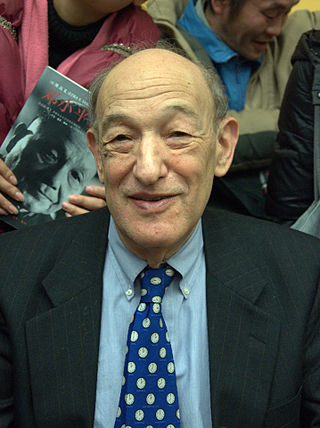
Ezra Feivel Vogel was an American sociologist who wrote on modern Japan, China, and Korea. He was Henry Ford II Professor of the Social Sciences at Harvard University.

Han nationalism is a form of ethnic nationalism asserting ethnically Han Chinese as the exclusive constituents of the Chinese nation. It is often in dialogue with other conceptions of Chinese nationalism, often mutually-exclusive or otherwise contradictory ones. Han Chinese are the dominant ethnic group in both states claiming to represent the Chinese nation: the Republic of China and the People's Republic of China.

The Twenty-One Demands was a set of demands made during the First World War by the Empire of Japan under Prime Minister Ōkuma Shigenobu to the government of the Republic of China on 18 January 1915. The secret demands would greatly extend Japanese control of China. Japan would keep the former German areas it had conquered at the start of World War I in 1914 and would be strong in Manchuria and South Mongolia while having an expanded role in railways. The most extreme demands would give Japan a decisive voice in finance, policing, and government affairs. The last part would make China in effect a protectorate of Japan, and thereby reduce Western influence.

John King Fairbank was an American historian of China and United States–China relations. He taught at Harvard University from 1936 until his retirement in 1977. He is credited with building the field of China studies in the United States after World War II with his organizational ability, his mentorship of students, support of fellow scholars, and formulation of basic concepts to be tested.
Robert S. Ross is a professor of political science at Boston College, associate of the Fairbank Center for Chinese Studies at Harvard University, senior advisor of the security studies program at the Massachusetts Institute of Technology, and a member of the Council on Foreign Relations. He is one of the foremost American specialists on Chinese foreign and defense policy and U.S.-China relations.

The Great Wall of China is a series of fortifications in China. They were built across the historical northern borders of ancient Chinese states and Imperial China as protection against various nomadic groups from the Eurasian Steppe. The first walls date to the 7th century BC; these were joined together in the Qin dynasty. Successive dynasties expanded the wall system; the best-known sections were built by the Ming dynasty (1368–1644).

The century of humiliation was a period in Chinese history beginning with the First Opium War (1839–1842), and ending in 1945 with China emerging out of the Second World War as one of the Big Four and established as a permanent member of the United Nations Security Council, or alternately, ending in 1949 with the founding of the People's Republic of China. The century-long period is typified by the decline, defeat and political fragmentation of the Qing dynasty and the subsequent Republic of China, which led to demoralizing foreign intervention, annexation and subjugation of China by Western powers, Russia, and Japan.

BM Jain is an Indian political scientist and Sinologist, who has developed and popularized psycho-cultural and geopsychological paradigms in the field of international relations (IR) and international security. He has developed the theory of geopsychology in IR as an alternative to mainstream IR theories. He defines it as "a set of perceptions, images, and belief systems, formed of shared history, culture, nationalism, religion, and ethnicity, which shape the mindsets and behavioral patterns of non-state and authoritarian actors and communities inhabiting a specific geographical area." In understanding China's foreign policy behavior, for instance, he has applied the geopsychology theoretical framework that lists core elements of China's geopsychology: Century of humiliation, the Middle Kingdom syndrome, cultural pride, nationalism, strategic culture, and the anti-hegemony discourse.
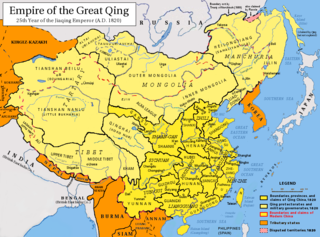
The tributary system of China, or Cefeng system at its height was a network of loose international relations centered around China which facilitated trade and foreign relations by acknowledging China's hegemonic role within a Sinocentric world order. It involved multiple relationships of trade, military force, diplomacy and ritual. The other states had to send a tributary envoy to China on schedule, who would kowtow to the Chinese emperor as a form of tribute, and acknowledge his superiority and precedence. The other countries followed China's formal ritual in order to keep the peace with the more powerful neighbor and be eligible for diplomatic or military help under certain conditions. Political actors within the tributary system were largely autonomous and in almost all cases virtually independent.

The history of the Great Wall of China began when fortifications built by various states during the Spring and Autumn and Warring States periods were connected by the first emperor of China, Qin Shi Huang, to protect his newly founded Qin dynasty against incursions by nomads from Inner Asia. The walls were built of rammed earth, constructed using forced labour, and by 212 BC ran from Gansu to the coast of southern Manchuria.
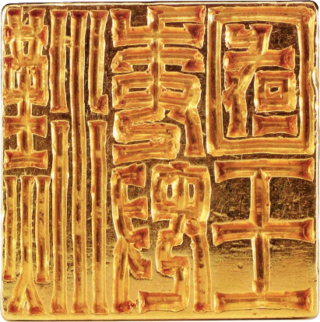
The history of China–Japan relations spans thousands of years through trade, cultural exchanges, friendships, and conflicts. Japan has deep historical and cultural ties with China; cultural contacts throughout its history have strongly influenced the nation – including its writing system architecture, cuisine, culture, literature, religion, philosophy, and law.

Zhao Yi was a poet, historian, and critic during the Qing dynasty in China. Zhao is notable for his innovative poetry, his historical writings, and for espousing unconventional views on various aspects of Chinese dynastic history.

The Thucydides Trap, or Thucydides' Trap, is a term popularized by American political scientist Graham T. Allison to describe an apparent tendency towards war when an emerging power threatens to displace an existing great power as a regional or international hegemon. The term exploded in popularity in 2015 and primarily applies to analysis of China–United States relations.
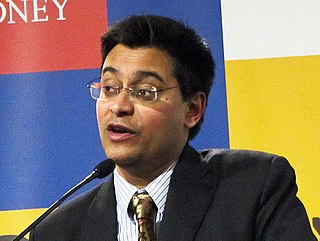
Rana Shantashil Rajyeswar Mitter is a British historian and political scientist of Indian descent who specialises in the History of the People's Republic of China. He is ST Lee Chair in US-Asia Relations at the Harvard Kennedy School.

The Ming Great Wall, built by the Ming dynasty (1368–1644), forms the most visible parts of the Great Wall of China today. A comprehensive archaeological survey, using advanced technologies, has concluded that the Ming walls measure 8,850 km (5,500 mi) from Jiayu Pass in the west to the sea in Shanhai Pass, then looping over to terminate in Manchuria at the Hushan Great Wall. This is made up of 6,259 km (3,889 mi) sections of actual wall, 359 km (223 mi) of trenches and 2,232 km (1,387 mi) of natural defensive barriers such as hills and rivers.
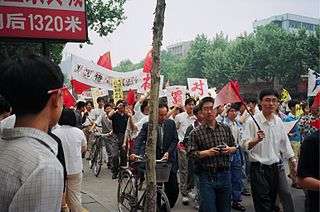
There is a history of anti-Americanism in China, beginning with the general disdain for foreigners in the early 19th century that culminated in the Boxer Rebellion of 1900, which the United States Marine Corps participated with other powers in suppressing. The 1905 Chinese boycott of American goods to protest discrimination against the Chinese living in America had a major negative impact on Chinese attitudes. After the Chinese Civil War, the United States and China fought an undeclared war during the Korean War, in which 148,000 Chinese soldiers died, that left bitter feelings on both sides. Relations warmed up after 1970, but large-scale anti-American sentiments significantly increased since US President Donald Trump launched a trade war against China in the late 2010s.

Vietnamese nationalism is a form of nationalism that asserts the Vietnamese people as a separate independent nation. It encompasses a broad range of ideas and sentiments harbored by the Vietnamese people in regards with national identity.

The history of Japanese foreign relations deals with the international relations in terms of diplomacy, economics and political affairs from about 1850 to 2000. The kingdom was largely isolated before the 1850s, with limited contacts through Dutch traders. The Meiji Restoration was a political revolution that installed a new leadership that was eager to borrow Western technology and organization. The government in Tokyo carefully monitored and controlled outside interactions. Japanese delegations to Europe brought back European standards which were widely imposed across the government and the economy. Trade flourished, and Japan rapidly industrialized. In the late 19th century Japan defeated China, and acquired numerous colonies, including Formosa and Okinawa. The rapid advances in Japanese military prowess led to the Russo-Japanese War, the first time a non-Western nation defeated a European power. Imperialism continued as it took control of Korea, and began moving into Manchuria. Its only military alliance was with Great Britain, from 1902 to 1923. In the First World War, it joined the Entente powers, and seized many German possessions in the Pacific and in China.
Xiaoyuan Liu is a historian, author, and academic most known for his work in the field of East Asian international history and ethnopolitical history of 20th century China. He is the David Dean 21st Century Professor of Asian Studies and Professor of History in the Corcoran Department of History at the University of Virginia.

















